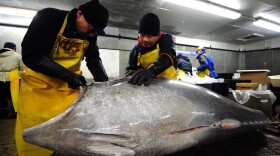
Fred Bever
Fred Bever joins NHPR with an extensive reporting background for public radio and other media. Bever has provided live and taped content for NPR, the BBC, WBUR in Boston and New England Public Radio. His most prominent work was his live on-scene coverage of the hunt for the Boston Marathon bombing suspects and its aftermath.
Fred has worked as News Director at New England Public Radio, Chief Political Correspondent for Maine Public Broadcasting Network, and as a freelancer for myriad outlets covering politics, public affairs, business, energy and science.
-
Maine's economy relies heavily on summer tourism. With Memorial Day around the corner, many business owners are figuring out when and whether they'll be allowed to reopen.
-
No matter where in the globe former President Bush's pursuits took him, he circled back every year, as if tethered, to Walker's Point — his family's estate in Kennebunkport, Maine.
-
Most catches are exported to unagi-loving Asian nations, which pay up to thousands of dollars per pound. But one woman is raising and marketing eels for U.S. buyers: "Why not keep that value at home?"
-
Scientists says to help whales, the ropes used to tend lobster traps must be changed or eliminated. Mainers who catch lobster for a living feel they're being singled out for an international problem.
-
After decades with no sign of a lethal neurotoxin, the algae that produces it is now plaguing the warming waters of the Gulf of Maine, forcing unprecedented closures in shellfish harvesting.
-
New England fishers say it's been decades since they've hauled in so many tuna, and some in the industry are urging higher quotas. But some environmental groups fear the population is still imperiled.
-
If you've ever dreamed of the good life on one of Maine's coastal islands, be forewarned: the Internet ranges from lousy to nonexistent.
-
A trawling experiment in the Gulf of Maine aims to scoop up abundant and profitable flatfish, while bypassing the once plentiful but now depleted cod population. So far, the results are promising.
-
Why are chefs adopting sea greens in their cuisine? They're tasty and nutritious, and growing them is good for the planet. Maine's budding seaweed business is boosting an endangered coastal economy.









